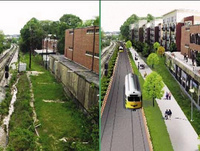 The most common reaction to any proposal of rail transit near Valdosta or Lowndes County is “there’s not enough population”. Yet there’s this:
The most common reaction to any proposal of rail transit near Valdosta or Lowndes County is “there’s not enough population”. Yet there’s this:
Another rail opponents’ argument has yet to be addressed: Atlanta is simply too spread-out to make passenger trains worthwhile. The Beltline runs in circles around the most important job center — downtown — and will have to rely instead on connections with MARTA for those commuters.If even sprawl-happy Atlanta can manage denser rail-based development, Lowndes County can, too. A start would be to have the bus system (Valdosta, Lowndes County, or combined) run all the way around Perimiter Road, which is the local equivalent of the Beltline.Yet, despite all that, city leaders still believe in what first Gravel imparted: take these old train tracks, make them useful and pleasant, and development will come.
It will be a different kind of development, pedestrian-friendly and a bit denser in place of the car-friendly sprawl. The new buildings that spring up around Beltline transit stops and parks will give Atlanta new places for people to live. And it will be an agreeable place, improving land values and enhancing property tax revenues.
People say the east side of Perimeter Road was intended for industry. Well, maybe, but there is already a school and at least one subdivision there, and it could also be used for affordable housing, especially if there was bus or train service.
Maybe we should try this kind of stakeholder involvement:
Tax Allocation District Advisory CommitteeInstead of holding a few meetings and hoping people show up (and that is already an improvement over previous days), maybe actively seek out stakeholders both pro and con and get them regularly involved.The TADAC is made up of stakeholders from across the broad spectrum of Atlanta and is composed of community members representing the Atlanta neighborhoods and technical experts with a commitment to making the BeltLine a success for the City. Including experience in the area of parks and trails planning and development; transit planning and development; finance and business; complex project management; affordable housing; urban planning; arts and culture; historic preservation; green building principles and other subjects relevant to the BeltLine.
-jsq
Short Link: